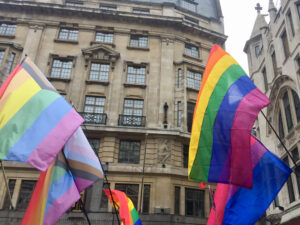Solidarity is at the heart of Pride
This blog is more than a year old
My heroes this Pride Month are the union reps making work better for LGBT+ people every day across the country. Whilst Pride today looks a lot like a commercial shop front – what products don’t suddenly sport a rainbow flag? – this year’s fiftieth anniversary of the first London Pride is a timely reminder that its roots go much deeper.

Solidarity is at the heart of Pride: unity, mutual support, defiance. At the first Pride protest in 1972, around 2,000 participants took to the streets together. Whilst we have made progress since then, our job is far from done. Not least in the atmosphere of division that has sprung up against trans friends and colleagues over these last few years.
Work remains one of the frontiers for equality. A TUC survey of LGBT+ workers found that nearly two-in-five respondents had been harassed or discriminated against by a colleague, yet only a third reported the incident to their employer. The incidence of bullying rises to almost half for trans workers. According to a Business in the Community report, 79% of LGBT+ people are likely to have experienced poor mental health where work was a cause or a contributing factor.
That is why in workplaces across the country, union representatives and volunteers are supporting colleagues and fixing problems at work. I am consistently amazed by the volunteer hours union reps and members give: helping colleagues, being part of staff LGBT+ Networks and ensuring Equality, Diversity and Inclusion policies actually work for workers (rather than just being corporate rhetoric).
Every day, union reps are speaking to, organising and challenging employers to be better on equalities, whether that is supporting people when things go wrong at work or raising the bar on what equality at work should look like. At Prospect we have a growing LGBT+ Network sharing ideas across employers and leading union-wide campaigns. Trade unions and community groups form the backbone of many Pride events across the country, and together work to support the growth of events such as UK Black Pride.
Over the past two years alone, Prospect’s legal team have won justice for members subject to homophobic abuse at work, and successfully challenged employers who have not stepped in to protect members from bullying or harassment. From challenging abuse dressed up as ‘banter’ through to ensuring employer practices are inclusive, this is a union agenda. And it relies on our reps and members to make it happen.
Unions have a long history of supporting equality. But we are also organisations that have changed over time to become better at involving and representing the full diversity of our membership. Pride as a protest is something we understand, as are the insecurity and barriers too many people face at work.
We are also learning from the lived experiences of our members to join up our equalities work, for instance making the connection between racism and homophobia, standing up for trans and non-binary members, and thinking through additional levels of discrimination faced by lesbians and bisexual women at work.
Pride is about recognising we have more to do on equality to ensure no one is left behind. The thing that unites our values as a union and on equality is that we make change happen by working together. That remains a work in progress. So, this year, my heroes are the union reps and volunteers doing this every day – pushing for change and fighting for equality.